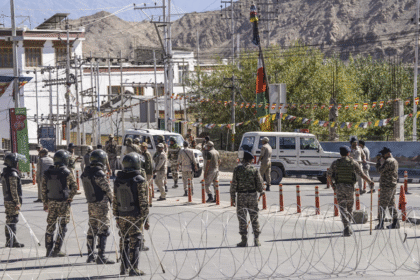9 Bus Passengers Kidnapped, Killed by Armed Men in Pakistan’s Balochistan Province in Brutal Attack
Nine bus passengers were kidnapped and brutally killed by armed men in Pakistan’s Balochistan province. Authorities suspect a targeted militant attack amid rising regional unrest
A group of armed men kidnapped and killed nine bus passengers in Pakistan’s southwestern Balochistan province, officials confirmed on Friday.

According to provincial government spokesman Shahid Rind, the passengers were kidnapped from multiple buses on Thursday evening. The attackers then took them into the nearby mountainous region, as reported by the news agency Reuters.
Another government official, Naveed Alam, said that the bodies of the victims were discovered overnight. “Their bodies with bullet wounds were found in the mountains overnight,” he said.
No group has claimed responsibility for the killings so far. However, similar incidents in the past have been linked to separatist Baloch militants, who have targeted individuals after identifying them as being from the eastern Punjab province.
The Baloch Liberation Army, one of the most active insurgent groups in the region, has long operated in the mineral-rich province bordering Afghanistan and Iran. Ethnic Baloch militants accuse the Pakistani authorities of exploiting Balochistan’s resources to benefit the Punjab province, leading to ongoing unrest and violence.

In a horrifying act of violence that has sent shockwaves across Pakistan, nine passengers traveling on a bus through Balochistan were abducted and executed by armed militants in the Noshki district late Thursday night. The brazen attack has reignited fears of escalating insurgency and lawlessness in the country’s largest yet most volatile province.
According to police and provincial officials, the victims were forcibly removed from a passenger bus traveling from Quetta to Taftan near the Iran border. Their bodies were later discovered riddled with bullets on the side of the highway, sending alarm across the region.
Eyewitnesses and survivors reported that around 11:30 PM, a group of heavily armed men wearing paramilitary-style clothing intercepted the bus at a fake security checkpoint near the mountainous stretch of the N-40 highway. The gunmen reportedly checked national identity cards (NICs) before selectively abducting certain passengers.

“Ten men were taken at gunpoint. They were blindfolded and led into the nearby hills,” said a survivor, who spoke to local media on condition of anonymity. “We pleaded with them, but they warned us to stay quiet or face the same fate.”
The next morning, nine of the abducted passengers were found dead — their hands tied, shot at close range. One person was found alive but critically injured and has been shifted to the Civil Hospital in Quetta under tight security.
Authorities have identified the victims as civilian men, primarily from Punjab and Khyber Pakhtunkhwa provinces, who were traveling either for work or religious pilgrimage toward the Iranian border town of Taftan. At least two were confirmed to be government employees on official duty.
The names and photographs of the victims have not yet been officially released, pending notification of their families.
While no group has immediately claimed responsibility for the massacre, security experts and intelligence agencies suspect the involvement of Baloch separatist groups, particularly factions known to operate in the Makran and Noshki regions.
These groups have carried out similar attacks in the past, targeting individuals they perceive as “outsiders” or symbols of the federal government. The Baloch Liberation Army (BLA) and the Baloch Republican Army (BRA) have previously claimed similar abductions and targeted killings.
“The nature of the attack, the selective abduction based on identity, and the brutality of the killings all suggest a targeted militant operation,” said a senior intelligence officer in Quetta.
The Balochistan Home Minister Zia Langove condemned the attack, calling it “a cowardly act of terror meant to destabilize the region.” He vowed a full investigation and pledged that the perpetrators would be hunted down.
The Pakistan Army’s Inter-Services Public Relations (ISPR) released a brief statement confirming that search operations had been launched in the surrounding mountainous terrain with helicopter support and ground troops.
“We will not allow terrorists to sabotage peace in Balochistan. Those responsible will face the full force of the law,” said Langove during a press briefing.
In addition, Prime Minister Shehbaz Sharif expressed his condolences and urged both civilian and military agencies to work in tandem to restore order in the region.
Balochistan, which makes up nearly 44% of Pakistan’s landmass but only 6% of its population, has long been a hotbed of ethno-nationalist insurgency, sectarian violence, and cross-border militant activity.
Over the past two decades, separatist outfits have waged a violent campaign for greater autonomy and control over the province’s rich natural resources, including gas, minerals, and gold reserves. Civilians, infrastructure workers, and government personnel have often found themselves caught in the crossfire.
According to the South Asia Terrorism Portal (SATP), over 300 people have been killed in militant-related violence in Balochistan in the past 12 months alone.
The bus route between Quetta and Taftan — which leads to the Iran–Pakistan border crossing — has become increasingly dangerous, particularly for pilgrims and traders. The area has also been plagued by drug trafficking, armed robberies, and militant ambushes.
This latest attack may severely impact cross-border movement and religious tourism. The Pakistan-Iran border crossing at Taftan is a key transit point for thousands of Shia pilgrims heading to Iran and Iraq for religious observance.
The Balochistan Levies, Frontier Corps, and local police have all been criticized in the past for failing to protect this sensitive corridor. Civil society groups are now demanding the deployment of special forces or aerial patrol units to ensure the safety of civilians.
The Human Rights Commission of Pakistan (HRCP) condemned the killings and called for a transparent, independent investigation.
“This is not merely a law-and-order failure but a gross violation of human rights. The people of Balochistan deserve better protection and justice,” the HRCP said in a statement.
Meanwhile, international human rights observers and foreign missions have expressed concern over the rising frequency of such attacks. There is growing pressure on the Pakistani government to increase oversight and accountability in its counter-insurgency operations, which some allege have also led to civilian casualties and enforced disappearances.
As news of the massacre spread, social media erupted with outrage. The hashtag #BalochistanAttack began trending on X (formerly Twitter), with users demanding justice and swift action.
Funeral arrangements are being made in the victims’ home provinces, with special flights arranged by the government to transport the bodies. Emotional scenes were reported at Quetta Airport and various train stations where families arrived to identify their loved ones.
“My brother left home to earn for his children. He didn’t deserve to die like this,” said an emotional relative of one of the victims.
Read Also : Bombay HC Dismisses PIL Against Salt Pan Land Transfer for Dharavi Redevelopment; 1,000s to Be Relocated







